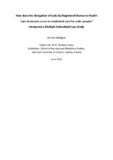| dc.contributor.advisor | Casey, Dympna | |
| dc.contributor.author | Mulligan, Deirdre | |
| dc.date.accessioned | 2022-10-13T12:40:22Z | |
| dc.date.available | 2022-10-13T12:40:22Z | |
| dc.date.issued | 2022-06-29 | |
| dc.identifier.uri | http://hdl.handle.net/10379/17417 | |
| dc.description.abstract | There is a need to develop safe and effective nursing teams within residential care for older people
(RCOP) with an appropriate and sustainable skill mix to meet the increasing demands of the ageing
population. This requires that registered nurses (RNs) and healthcare assistants (HCAs) work
collaboratively to their full scope of practice. In RCOP, where there are often less RNs than HCAs,
delegation of tasks emerges as a critical issue. The aim of this study was to explore how delegation
of tasks by RNs to HCAs occurred in RCOP settings in Ireland.
An interpretive, multiple case study research design was applied. Two cases were selected for in-
depth study. The sub-units of analysis were the perspectives and experiences of the staff, the staff
profiles and allocation model, documents relating to delegation, and the process of delegation in the
real world of practice. The data sources were: focus-group interviews, individual interviews, direct
observations during predicted periods of delegation, and documentary review. The framework for
within-case and cross-case analysis was the interactive data analytical approach of Miles et al.
(2020). The theoretical lens of organisational role theory, applying the Kahn et al. (1964) role
episode model (REM), was used to understand, interpret and explain the findings.
Three themes were developed in relation to how the delegation of tasks by RNs to HCAs occurred in
RCOP: Creating the conditions, How it happens, and Knowing what I should do. The facilitators and
barriers for effective RN delegation were identified.
The role of the RN in RCOP is changing, and this has affected the context and process of effective
delegation. With increasing demands for care of older people and increasing shortages of RNs in
RCOP services the shifting of nursing tasks to HCAs has occurred. The findings of this study can guide
the development of more effective RN delegation, contribute to improving RN and HCA role clarity,
and ultimately support safe and quality care of vulnerable older people. | en_IE |
| dc.publisher | NUI Galway | |
| dc.rights | Attribution-NonCommercial-NoDerivs 3.0 Ireland | |
| dc.rights | CC BY-NC-ND 3.0 IE | |
| dc.rights.uri | https://creativecommons.org/licenses/by-nc-nd/3.0/ie/ | |
| dc.rights.uri | https://creativecommons.org/licenses/by-nc-nd/3.0/ie/ | |
| dc.subject | delegation | en_IE |
| dc.subject | registered nurse | en_IE |
| dc.subject | health care assistant | en_IE |
| dc.subject | assignment | en_IE |
| dc.subject | residential care for older people | en_IE |
| dc.subject | role theory | en_IE |
| dc.subject | Medicine, Nursing, and Health Sciences | en_IE |
| dc.subject | Nursing and Midwifery | en_IE |
| dc.subject | Nursing | en_IE |
| dc.title | How does the delegation of tasks by registered nurses to health care assistants occur in residential care for older people? Interpretive multiple embedded case study | en_IE |
| dc.type | Thesis | en |
| dc.local.note | With increasing demands for residential care for older people and an increasing shortage of nurses (RNs) there is a need to develop safe and effective nursing teams in residential care for older people. This requires nurses and healthcare assistants working together to the full scope of their roles. This study explored how nurses delegated to HCAs, and identified the barriers and facilitators for effective delegation. | en_IE |
| dc.local.final | Yes | en_IE |
| nui.item.downloads | 421 | |


